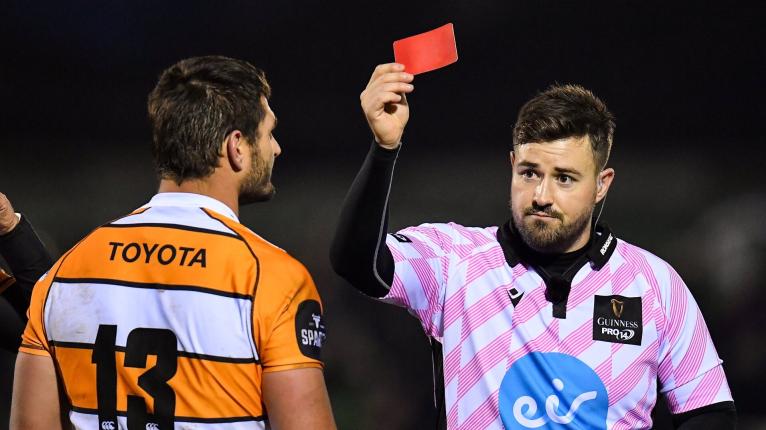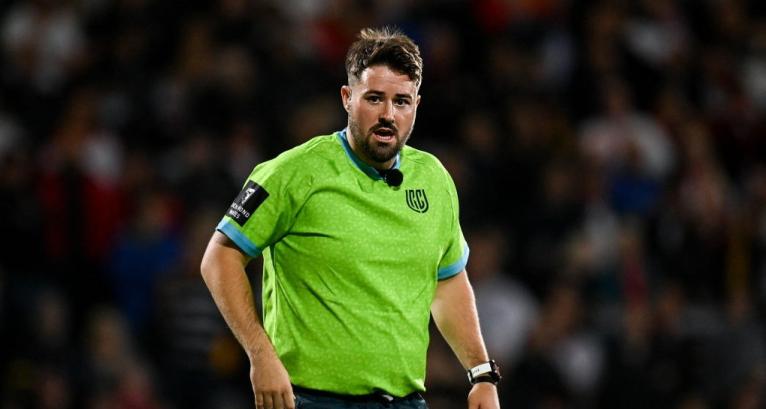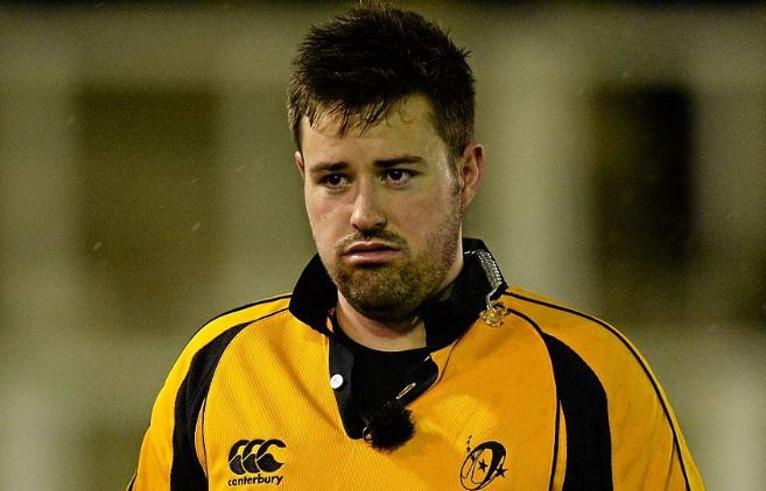Ben Whitehouse: 'I saw a Tweet the other day about me... that is tough'

Ben Whitehouse has been through a lot during his ten years as a top-flight referee and international TMO.
There’s been the abuse and threatening messages which have come his way. Then there was his diagnosis with Crohn’s Disease and a subsequent battle with life-threatening sepsis.
But as he looks back on it all, one thing is clear, he has absolutely no regrets about picking up the whistle.
The 33-year-old Welsh official has just reached a notable career landmark, having taken charge of his 100th league game in last weekend’s winner-takes-all clash between Benetton and Edinburgh.
It’s been a big season for him all round. He officiated at his first men’s World Cup in the autumn, culminating in being the video referee for the semi-final between New Zealand and Argentina in Paris.
Then, in the Six Nations, he was again on TMO duties for three huge games – France v Ireland in Marseille, England v Ireland at Twickenham and France v England in Lyon.
The Swansea-born Whitehouse is very much following in the family tradition with his father Nigel having been an international referee.
As a youngster, he was a scrum-half at Gowerton Comprehensive, playing alongside a certain Dan Biggar, who was in the same year at school.
“We played all our junior rugby together. I was 9 and he was 10,” he recalls.

“I always tell him I turned him into the player he became because if he could play off my passing he could play off anyone’s!”
It was some straight-talking from his father that played a key part in Ben moving into officiating as a teenager.
“My dad obviously has an eye for rugby and he knew I was never going to play for Wales,” he says.
“I did a refereeing course at 16 just to help out at my home club Penclawdd RFC. Nigel Owens ran that actually.
“I did some kids stuff, literally U8s, then I started to take it seriously when I joined the police at 19 and was living away, near Newport, and couldn’t always get back down west to play on weekends because of my shifts.
“My dad was quite blunt that I was never going to go anywhere other than playing for Penclawdd. I had peace with that.
“He saw me reffing kids and said ‘You are good, give it a shot and see what happens’.
“I played my last game of rugby when I was 19 or 20 and it just went from there.”
Whitehouse made rapid strides, officiating at age-grade and club level before going on to take charge of his first league game in 2014 – Connacht v Zebre in the old PRO12.
But that same year came a big moment in his life when he was diagnosed with Crohn’s Disease, an inflammatory bowel condition.
“I didn’t know what it was,” he reveals. “I was struggling with fitness, I was training with everyone else and just couldn’t get myself fit.

“The problem with Crohn’s is you don’t know what’s around the corner. You can control it as best you can, but it’s such an unpredictable illness and you have got it for life. They haven’t got a cure for it yet.”
Following his diagnosis, he continued refereeing, but then in 2017 came a dramatic development with his condition.
“I went to referee Georgia v Belgium and I was ill going out there. I just thought I had the flu,” he says.
“I stayed in bed for 24 hours. I got out of bed, put my kit on, went to the game, did the match, came back and was straight back into bed for another 14 hours or so.
“When I got home, I remember my missus and my mum saying there is something not right here, you need to go into hospital.
“So I went in, they did some blood tests and all of a sudden a flood of medics came rushing into my room. They said you have got sepsis and it is spreading around your body.
“Basically, where I had an ulcer from my Crohn’s, it had got infected and perforated my intestine. It was really worrying.”
Such was the severity of the situation, Whitehouse had to undergo major surgery.
“They basically opened me up. I have got a big old scar now from the bottom of my chest down to my waistband.
“I owe my surgeon Mark Davies my life really. He not only saved my life, but saved my career. It was a worrying time.”
With the surgery successful, Whitehouse was able to resume refereeing, for which he is eternally grateful.
Yet, with the job, comes a downside in terms of the criticism officials often face.
“I realised relatively early on, within the first couple of years, that it would affect me, reading good press, bad press,” he admits.
“Good press would inflate me and I would feel brilliant about myself, but when I read the bad stuff that would really deflate me.
“So I just said I’ve got a choice here, I either keep going on this emotional rollercoaster or I just ignore it and try and stay away from it. That’s the approach I took in the end. If you don’t like what you are reading, then try not to read it.”
However, it isn’t always possible to shut everything out, such is all the pervasive nature of social media.
“I saw there was a Tweet the other day about me doing my 100th game and there were some really nice comments on there, but there were also some not so nice ones in the thread.

“I am not here to get praise, but you’ve got people on there wanting to tell you that you are rubbish.
“You can get a lot of abuse. People assassinate characters on social media, that is tough.
“The emotional reactions tend to be the ones.
“People are entitled to their opinion, they are allowed to say they don’t agree with a decision, but when it becomes a personal attack that’s tough.
“Some people do take it too far, but that’s probably just the world we live in at the moment, not just rugby or sport.”
He continues: “Of all the stuff people have said on Twitter, Instagram or whatever it is, there’s not many people who have ever come up to me in the street, in a bar or face-to-face post-game and actually said any of these things.
“It’s comforting that the real fans who are at the games don’t say those things. It’s often people sitting at home just wanting to voice their opinion, which is frustrating, but it’s part of the game.
“The important thing for me is my bosses trust me, otherwise they would have binned me off a long time ago.
“I feel I have a good relationship with the coaches and there is a trust level there. That’s what’s important to me.
“It would be nice for everyone to like you, but you know as a referee that’s never going to happen.
“I stay away from social media entirely after a big game. You are into a dangerous minefield otherwise of people voicing their opinions.
“It’s lovely when people say nice things about you, but you have to understand there is going to be a lot of bad press because a lot of what we do is in that grey area where half will agree with you and half will not.”
Whitehouse says having spent six years as a policeman before becoming a professional referee has helped give him a bit of a thick skin.
“If someone calls you a knobhead on Twitter, you are not worried for your life and there’s no danger of any violence.
“Whereas when I was in the police, you would turn up to some pretty gnarly incidents and you know you might have to deal with something serious.
“It’s just a game of rugby that we do. We need to realise that and put a level head on it sometimes.”
There was one particular occasion when the abuse really crossed the line.
“I remember doing Clermont v Northampton in 2017 and it’s fair to say I definitely didn’t have my best day in the office.
“I remember people direct messaging me saying ‘We know which hotel you are staying in, we are coming for you’.
“You know it’s just someone with a couple of pints in their hand, but there’s always that nagging doubt – is there that one idiot that might take this too far?”
Whitehouse adds: “The level of scrutiny, not just for match officials, but players and coaches as well, is just through the roof these days.
“We are a victim of our own success in rugby because the game is growing and there’s more coverage on social media which is great for the game, but that always brings another side to it.
“Sometimes we are damned if we do, damned if we don’t. You disallow a try for a small little knock on and half the world goes crazy over it.
“But, then, if you say there’s not much in that, play on, you get the other half saying ‘Why didn’t you come in for that knock on?’
“You know you are on to a loser a little bit, but we just try our best to get the big moments in the game right.”
Over the last few years, Whitehouse’s career has taken a significant turn as he has combined refereeing with TMO duties, which has seen him regularly involved on the international stage.
“During Covid, the then referee manager with the URC thought maybe my time in the league was slowly coming to an end,” he reveals.
“I disagreed, but I just think he wanted to get a new crop of referees through.
“It was a tough period, mentally tough. Our contracts were up at the end of the year. It was a case of do I fight or do I just say thanks very much and shake the hand?
“I just said ‘Do you know what, I think I’ve got more to offer’.
“Then World Rugby asked me if I had considered being a TMO. My initial thoughts were absolutely not because it was always seen as a role for retired referees and I said I was absolutely not retired.
“But then I thought to myself ‘You know what, I will grab the bull by the horns here and keep myself involved at the very top of the game and not cut my nose off to spite my face’.
“My first few games as a TMO were bloody horrible. I look back and I was all over the shop, but then I knuckled down and tried to work on the craft and thankfully I’ve got some massive games over the last three years. It’s been really good.
“It’s fantastic to be involved in those big international matches, but I still prefer refereeing. There’s nothing like being in the middle of the field, best seat in the house, referring.
“Being a TMO is probably the more lonely role. Sometimes you think you have made the right decision, but you still feel that hint of doubt in your stomach when you have got those 50-50 calls you have to make.”
As for how he has changed as an official over the past decade, he says: “I feel like a different referee now.
“When you start as a young ref, you either fade away and stay out of it all or you try and stamp your authority.
“I look back and I’m probably a little bit disappointed how I dealt with it initially.
“I was 24 making my debut and I knew I was the youngest referee in the league by close on ten years.
“I wanted to go out and say ‘Right, I may be 24, but I am strong’.
“I look back at some of the conversations I have had with players on the field – like the incident between me and Connacht’s John Muldoon which went viral – and I think I would probably deal with that a lot differently now.
Congratulations Ben Whitehouse on refereeing 1️⃣0️⃣0️⃣ URC games 👏 #BKTURC #URC https://t.co/aO5cpAvt1j pic.twitter.com/Dq7IZlBS5V
— BKT United Rugby Championship (URC) (@URCOfficial) May 28, 2024
“It’s a journey at the end of the day. No-one is perfect when they start, I’m definitely nowhere near perfect now, but experience makes you a lot better.
“I also think the TMO side of it has improved me as a referee, in terms of working under pressure in a small time-frame.”
Looking back on his career, he concludes: “So much has happened.
“There have been plenty of ups and downs, highs and lows, that’s for sure.
“There were the struggles with my health and being told I may not be able to referee again. Those were dark moments, a dark six months for me.”
So, any regrets?
“No, never. I have loved pretty much every minute of it.
“Every day has provided a challenge. I loved being in the police, but becoming a referee is the best decision I have ever made and I would encourage anyone to do it.
“It has taken me to places all over the world and I’ve been involved in some of the biggest games in the world.
“I am sure when I am sitting in my armchair at 70 years old, I will say I made the right decision becoming a referee.”





























































